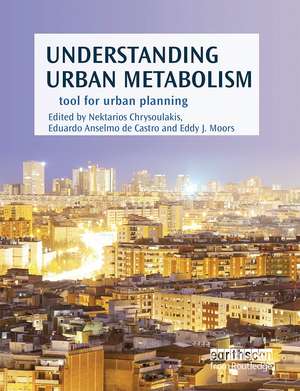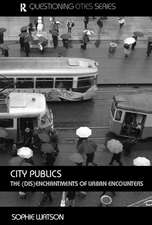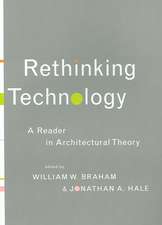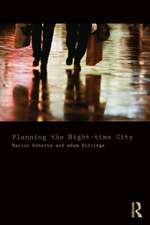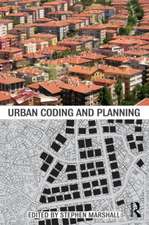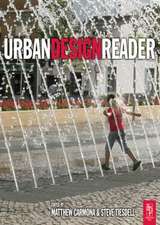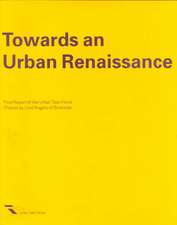Understanding Urban Metabolism: A Tool for Urban Planning
Editat de Nektarios Chrysoulakis, Eduardo Anselmo de Castro, Eddy J. Moorsen Limba Engleză Paperback – 30 sep 2020
The inclusion of sustainability principles into urban planning provides an opportunity to place the new knowledge provided by bio-physical sciences at the centre of the planning process, but there is a strong need to bridge knowledge and practice, as well as for a better dissemination of research results and exchange of best practice. This book meets that need and provides the reader with the necessary tools to integrate an understanding of urban metabolism into urban planning practice.
| Toate formatele și edițiile | Preț | Express |
|---|---|---|
| Paperback (1) | 216.41 lei 6-8 săpt. | |
| Taylor & Francis – 30 sep 2020 | 216.41 lei 6-8 săpt. | |
| Hardback (1) | 767.88 lei 6-8 săpt. | |
| Taylor & Francis – 12 aug 2014 | 767.88 lei 6-8 săpt. |
Preț: 216.41 lei
Preț vechi: 258.85 lei
-16% Nou
Puncte Express: 325
Preț estimativ în valută:
41.41€ • 43.24$ • 34.19£
41.41€ • 43.24$ • 34.19£
Carte tipărită la comandă
Livrare economică 16-30 aprilie
Preluare comenzi: 021 569.72.76
Specificații
ISBN-13: 9780367670115
ISBN-10: 0367670119
Pagini: 256
Dimensiuni: 189 x 246 mm
Greutate: 0.47 kg
Ediția:1
Editura: Taylor & Francis
Colecția Routledge
Locul publicării:Oxford, United Kingdom
ISBN-10: 0367670119
Pagini: 256
Dimensiuni: 189 x 246 mm
Greutate: 0.47 kg
Ediția:1
Editura: Taylor & Francis
Colecția Routledge
Locul publicării:Oxford, United Kingdom
Public țintă
Professional Practice & DevelopmentCuprins
Part 1: Introduction 1. Urban Metabolism 2. Decision Support Tools for Urban Planning 3. The BRIDGE Approach Part 2: Measurements and Modelling of Physical Flows 4. Physical Fluxes in the Urban Environment 5. Environmental Measurements in BRIDGE Case Studies 6. Use of Earth Observation to support Urban Modelling Parameterization in BRIDGE 7. Meso-scale Meteorological Models in the Urban Context 8. Urban Air Quality Models 9. Urban Energy Budget Models 10. Urban Water Balance and Hydrology Models 11. Urban Carbon Budget Modelling Part 3: The Socioeconomic Components 12. The Use of Communities of Practice to Involve Stakeholders in the DSS Design 13. Collection of Socioeconomic Data and Indicators for Urban Integrated Modelling 14. Combining Environmental and Socioeconomic Data Part 4: The BRIDGE DSS 15. The BRIDGE Impact Assessment Framework 16. The BRIDGE DSS 17. Decision Making under Certainty: Use of Foresight for Assessing Planning Alternatives 18. Guidelines for Urban Sustainable Development Part 5: Conclusions 19. Conclusions
Notă biografică
Nektarios Chrysoulakis is a Researcher Director at the Foundation for Research and Technology - Hellas in Herakleion, Greece. He holds a BSc in Physics, a MSc in Environmental Physics and PhD in Remote Sensing from the University of Athens. He has been involved in R&D projects funded from organizations such as the European Union, the European Space Agency and the Ministries of Environment, Development, Culture and Education. He has considerable experience in the area of Earth Observation and GIS. His main research interests include urban research, urban energy balance, natural and technological risk analysis, thermal infrared imagery and surface temperature studies, environmental monitoring and change detection. He is the coordinator of the FP7 projects BRIDGE and GEOURBAN. He has more than 100 publications in peer-review journals and conference proceedings.
Eduardo Anselmo de Castro has a degree in Civil Engineering, an MSc in Local Geography, Local and Regional Planning and a PhD in Regional Economics. He is Associate Professor in the University of Aveiro, where he lectures courses of Regional Economics and Planning, and Social and Economic Analysis. Since 1992 he has been a member and regular coordinator of research teams participating in several European and National projects in Innovation and Development Policy, Regional Economics and Regional Policy, Strategic Spatial Planning, Socio-economic Evaluation of Telecommunication Services and Sustainable Development. He is author and co-author of more than 100 papers presented in national and international conferences or published in scientific journals and books.
Eddy J. Moors is Head of the research group Climate Change and Adaptive Land and Water Management of Alterra-Wageningen University and Research Centre, the Netherlands. The group focuses on developing innovative solutions to improve the quality of life within sustainable boundaries. Before coming to Alterra, Moors worked for Wageningen University, the Ministry of Defence of the Netherlands and in Africa and the Caribbean for the World Meteorological Organisation. His background is in hydro-meteorology. He has extensive experience in integrating different disciplines to tackle research questions that ask for an inter- and trans-disciplinary approach. He is and has been coordinator of numerous national and international projects ranging from Europe, Africa, India, East-Siberia to USA and Brazil. He is author and co-author of more than 70 peer-reviewed papers and numerous professional publications.
Eduardo Anselmo de Castro has a degree in Civil Engineering, an MSc in Local Geography, Local and Regional Planning and a PhD in Regional Economics. He is Associate Professor in the University of Aveiro, where he lectures courses of Regional Economics and Planning, and Social and Economic Analysis. Since 1992 he has been a member and regular coordinator of research teams participating in several European and National projects in Innovation and Development Policy, Regional Economics and Regional Policy, Strategic Spatial Planning, Socio-economic Evaluation of Telecommunication Services and Sustainable Development. He is author and co-author of more than 100 papers presented in national and international conferences or published in scientific journals and books.
Eddy J. Moors is Head of the research group Climate Change and Adaptive Land and Water Management of Alterra-Wageningen University and Research Centre, the Netherlands. The group focuses on developing innovative solutions to improve the quality of life within sustainable boundaries. Before coming to Alterra, Moors worked for Wageningen University, the Ministry of Defence of the Netherlands and in Africa and the Caribbean for the World Meteorological Organisation. His background is in hydro-meteorology. He has extensive experience in integrating different disciplines to tackle research questions that ask for an inter- and trans-disciplinary approach. He is and has been coordinator of numerous national and international projects ranging from Europe, Africa, India, East-Siberia to USA and Brazil. He is author and co-author of more than 70 peer-reviewed papers and numerous professional publications.
Descriere
Closes the gap between the bio-physical sciences and urban planning and illustrates the advantages of accounting for urban metabolism issues in urban design decisions.
